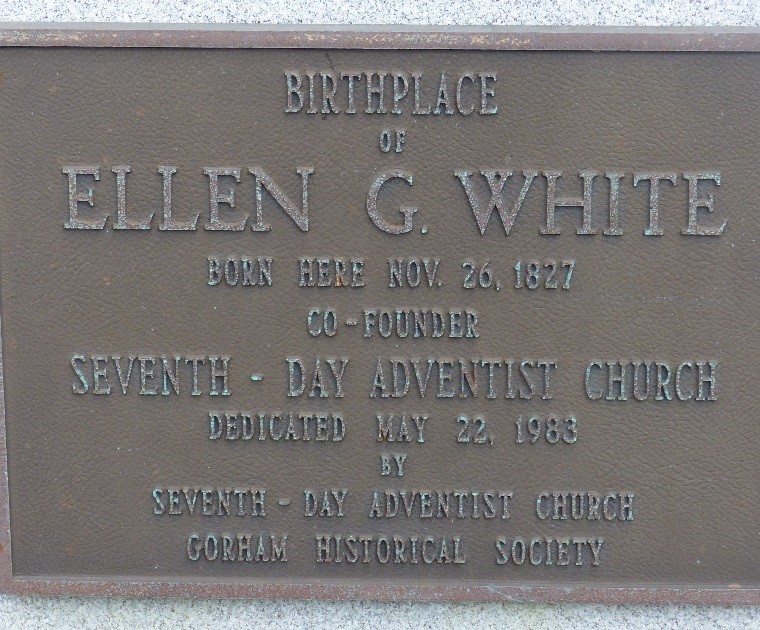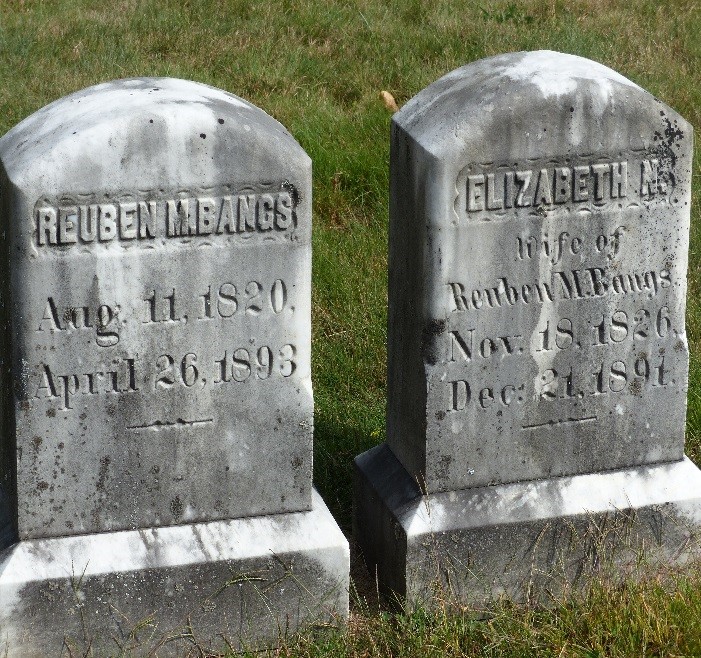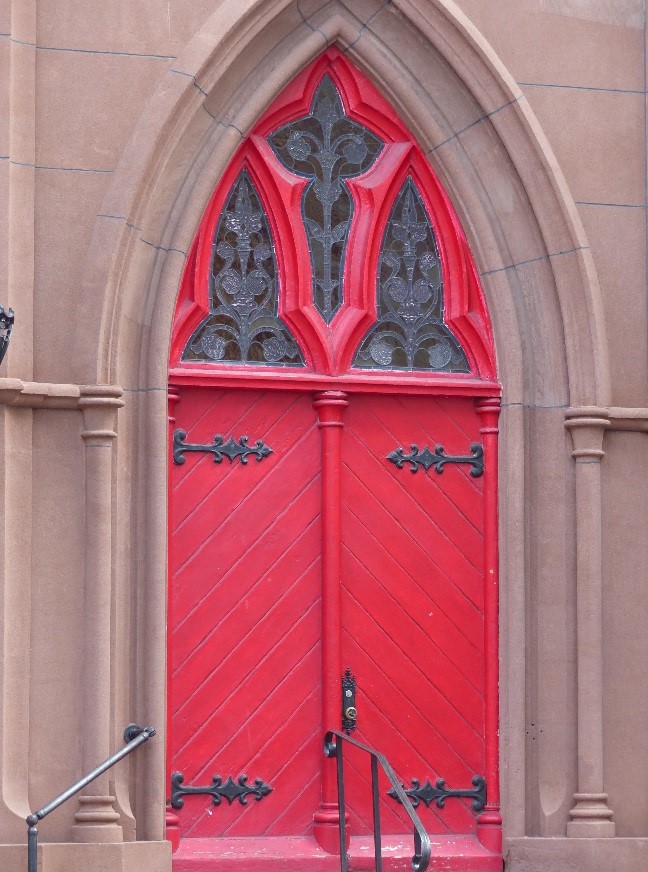Adventist Tomorrow, #14: Impeaching Fake Doctrines
by Jack Hoehn | November 12, 2019 |


Maine State Highway 114 runs for 36 miles starting near Portland, Maine. Deanne and I drove along it this September. About 10 miles out of Portland you come to Gorham, Maine. Here Highway 114 is called School Street, and then becomes Fort Hill Road passing, at about 11.6 miles, Fort Hill Park. There is a small cemetery here with a tombstone for Ellen Harmon White’s older brother Robert F. Harmon, who died in 1853 at age 26. Just a little further along on the right side of the road, if you watch for it, is a small granite marker. The brass plaque on the stone says, “Birthplace of Ellen G. White, born here November 26, 1827.”
Which is fine. Except she wasn’t born there. Just one mile further along Fort Hill Road is a cemetery with the gravestone of Ellen’s twin sister Elizabeth Harmon Bangs that lists her twin’s birth date as November 18, 1826. Fake-Birthplace Memorial? Fake-Birthday too?
The Ellen G. White (EGW) Encyclopedia says the actual birthplace of Ellen and her twin sister Elizabeth is unknown. And informed historians place the actual birthplace about two miles away.[1] The EGW Encyclopedia also admits to some uncertainty about her birthday. Ellen’s father (also named Robert Harmon) was a farmer and a hat-maker, and when his twin girls were still pre-school the family moved to the larger town of Portland, Maine. There they joined the Methodist church on Chestnut Street. The Methodist church following the reforms of John and Charles Wesley in London, England, was to become the largest denomination in the United States in the 19th century. It was a very organized form of Protestantism; it had specific ways of doing things. Methodists had methods.
Disfellowshipping Ellen Harmon
At age 11 (1840) and again at age 13 (1842) Ellen heard William Miller preach at Portland’s Casco Street Christian Church his conviction that Jesus Christ was soon to return to earth, and with her parents accepted the Adventist message.
The Millerites’ interpretation of Daniel’s prophecy to mean Christ would return in 1843 or 1844 was not, however, accepted by all Methodist leaders. Each week Methodists met in their classes where the class leader would ask each class member the same question, “How does your soul prosper?” And when the Harmon family shared their excitement over anticipation of the soon return of Jesus, it was met with concern, not pleasure, by their new pastor.
Methodists did not have a creed of 28 Fundamental Beliefs, but they did have a “General Rule” with quite specific tests for those truly following Jesus Christ.
Their First Rule was: “Avoiding evil of every kind, especially–
The taking of the name of God in vain.
The profaning the day of the Lord, either by doing ordinary work therein or by buying or selling.
Drunkenness: buying or selling spirituous liquors, or drinking them, unless in cases of extreme necessity.
Slaveholding; buying or selling slaves.
Fighting, quarreling, brawling, brother going to law with brother; returning evil for evil, or railing for railing; the using many words in buying or selling.
The buying or selling goods that have not paid the duty.
The giving or taking things on usury—i.e., unlawful interest.
Uncharitable or unprofitable conversation; particularly speaking evil of magistrates or of ministers.
Doing to others as we would not they should do unto us.
Doing what we know is not for the glory of God, as: The putting on of gold and costly apparel.
The taking such diversions as cannot be used in the name of the Lord Jesus.
The singing those songs, or reading those books, which do not tend to the knowledge or love of God.
Softness and needless self-indulgence.
Laying up treasure upon earth.
Borrowing without a probability of paying; or taking up goods without probability of paying for them.”
The Second Rule was,
“By doing good…” followed by several paragraphs detailing this good doing, including economic preference, i.e., “employing them [that are of the household of faith] preferably to others; buying one of another, helping each other in business.” Hire Methodists, buy from Methodists, help the business of fellow Methodists.
The Third Rule was,
“attending upon all the ordinances of God,” including church attendance, family and private prayer, partaking of communion, etc.[2]
Because of their public acceptance of the Millerite doctrine, in September 1843 the Harmon family was disfellowshipped from the Chestnut Street Methodist church, “Harmon family disfellowshipped for “long absence from our Church and ordinances and supporting an anti-Methodist doctrine and congregation, viz.: Millerism, etc.”[3]

In other words, the Harmon family may have been Christians and morally upright, but they didn’t fit the General Rules of Methodism, so they were disfellowshipped. I guess it is better to be disfellowshipped for an error in prophetic interpretation than for the sins of “softness,” “using many words in selling,” or “speaking evil of magistrates.”
Discipline of Fake-Christians
Seventh-day Adventists seem to be even more methodical than Methodists in regards to church discipline. We have a church manual presently at 234 pages! When it comes to discipline of erring church members, however, it is fairly precise:
“When grievous sins are involved, the church has two ways in which disciplinary measures must be taken: 1. By a vote of censure. 2. By a vote to remove from membership.”[4]
And then details are given for several pages on how to remove Fake-Adventists from church membership. But nowhere have I been able to find out how we can remove fake-doctrines from our church.
Fake-Doctrines
What fake-doctrines do we have? False fear-based theological constructs. Things that sincere, intelligent followers of God have believed in error. Beliefs that have scattered members, instead of gathering members to this church. If we have fake-doctrines, doesn’t this mean we are a Fake-Church? Only if we hold onto our errors. Being wrong is always an error, but holding onto an opinion once it has been shown to be wrong changes an error to a sin.
Just as there are errors on a monument to Ellen White’s birthplace, just as there are unchristian behaviors that need to be removed from a believer’s life, so we also have errors in our beliefs that need to be purged.
No errors in Adventism? Pardon me, our church was founded in error. The Chestnut Street Methodists were correct; the Millerites were wrong. We had to remove the Fake-Date-Setting for Jesus’ second coming. And most of our foundational doctrines are based on removing previous Christian errors. Fake-Sunday-Sabbath. Fake-Every-Burning-Hell. Fake-Immortality-of-Soul. Fake-Closed-Door-to-Salvation for non-Adventists. Fake-Salvation-by-Obedience to law. Ready for a few more?
Fake-Infallible-Bible
Adventist speak of the Bible as THE WORD OF GOD, but we often misunderstand OF.
God did not write the Bible. Jesus is “The Word of God,” but the Bible is words about God written by humans. The words of the Bible are not words FROM God. They are words from humans ABOUT God. Just as a book called Stories of Bravery would not be stories written by “Bravery” but stories about bravery. So the Bible as “The Word of God” must continue to be understood as not words by God, but words about God.
Understanding this makes demanding precision and perfection of the Bible much less compelling. It is easier to understand the Bible as a good but imperfect book, as sacred and holy but not immaculate when we remember what Peter Enns concluded. “The Bible looks the way it does,” he wrote, “because God let his children tell the story.”
“Inspired” or “breathed” by the Holy Spirit then means motivation to write and divine encouragement to write, but not control of the writing or perfection from inspired writers. The topics discussed in the Bible are holy—God, Jesus, Holy Spirit, heaven, death, sin, redemption. But the words about these holy things are human not divine. As Ellen White wrote, “God has not put Himself in words, in logic, in rhetoric, on trial in the Bible.”[5]
Honest Bible reading reveals there is not a single biblical view of a topic—honesty, sex, getting rich, raising children, marriage, singleness, health—there is not “a view”; there are biblical “views.” Rachel Evans notes, “And the people who wrote and assembled Scripture seemed perfectly fine with that unresolved tension.” “The Bible reflects the complexity and diversity of the human experience, with all its joys and sorrows.”
Winston Churchill once thundered, “Is the Bible true?” Then answered his own question, “Absolutely, every word of it! And if it’s not, it should be.” This realistic appreciation of the Bible, but understanding of its fallible humanity is necessary for spiritual health.
Fake-Chronology
There is no date for creation in the Bible. There is no date for the second coming of Christ in the Bible. Having a doctrine that Jesus will return on October 22, 1844, is just as extra-biblical as stating that the creation was recent and happened in 144 hours. Both these errors are impositions of human reason, counting of genealogies, guesses as to the duration of a prophetic day, heaped up upon the Scriptures. Now it was possible that Jesus would show up again on October 22. So it was no sin to think so, but it should never have been a doctrine in the church. Likewise, the doctrine that Christ is our Creator is firmly founded on scripture. But when and how he created remains completely a matter of conjecture, and any doctrine dating creation is as foolish as it was to set a date for the second coming.
Fake-Sexual Sin
The evangelical world is guilty of complicity in putting a dishonest, immoral narcissist in as the president of the USA based on their interpretation of abortion of an unborn fetus not as a tragedy, but as murder. Guilt and frustration fighting God-given sexual urges for millions of Christian youth has come by naming masturbation as sin. Naming gayness or sexual inversions as a choice, instead of as part of diversity, has led to criminalization of homosexuals and exclusion of same-sex marriage as a moral lifestyle.
The word homosexual does not appear in the Bible except where it has been inserted as an opinion. And while adultery and fornication are “abominations” and immoral for both straight and gay people, to criminalize moral homosexual relationships based on condemnation texts about male and female prostitution in the Old Testament, and sexual abuse by straight people of adolescent and economically deprived boys and girls in the New Testament was always an error. Discriminating against homosexuals is now a crime in most countries. The Bible is clearly against abuse of girls or boys by the powerful. It is against men who love women but are also fornicating with men. But that is not a discussion of homosexuality, gayness, or gender inversion. Cheap, thoughtless slogans such as “Adam and Eve, not Adam and Steve” only show superficiality and cruel disrespect for those so born.
Fake-Perfectionism
Ellen White wrote some wonderful things about God. She also wrote a terrible thing about us—”Those who are living upon the earth when the intercession of Christ shall cease in the sanctuary above are to stand in the sight of a holy God without a mediator” (The Great Controversy, p. 425). This small sentence and the theology of “last generation perfection” based on it has been toxic to hundreds of thousands of Adventists, and continues to be so up till today. I have met saints in their 90s who are still “hoping” they will be able to get into heaven? Why? Because they were taught that their acceptance with God is based on perfection of character and behavior. It is not. It never was. Desmond Ford, Morris Venden, and H.M.S. Richards were right. M.L. Andreasen, young Robert Brinsmead, and Last Generation for Christ are wrong. We are never without the covering righteousness of Jesus in the love of the Father. Salvation depends on our submission to Christ, not our perfection of behavior.
My sheep listen to my voice; I know them, and they follow me. I give them eternal life, and they shall never perish. . . . My Father, who has given them to me, is greater than all; no one can snatch them out of my Father’s hand (John 10:27-29).
Fake-Tithing
Setting aside a tenth of increase for religious and charitable purposes is an honorable tradition supported in Scripture. Demanding that all tithe belongs to the denomination, that the denomination has a right to know who is and who is not paying tithe to the church, and setting up categories of those who can be supported by the tithe is a completely human enterprise. For the wealthy to pay only 10% is a crime. For the poor to pay 10% at the expense of health and nutrition is a crime. Most of us good wage earners were pleased to be able to tithe through the denomination, until the denomination began to use our support to enforce fake-doctrines. Especially the male-headship heresy and its associated crime of female disrespect.
And there are certainly more of our understandings that need to be improved. What a wonderful privilege it is to study our beliefs and hold them up against Jesus, the Word of God, when we have misunderstood the Bible’s words about God.[6]
For crimes in government the United States can bring impeachment proceedings against Richard Milhous Nixon, William Jefferson Clinton, and Donald John Trump. For errors in our beliefs that have become recognized, how are we going to impeach those doctrinal errors as Adventist seek to follow present truth, instead of clinging to past error?
[1] https://sdamission.maps.arcgis.com/apps/MapTour/index.html?appid=8459739e2c9643d4847ad3c5a73d27cb Item number 21 on this interactive map details the best guess for birth of the twin Harmon girls. Item number 20 shows where the 1983 misplaced marker is placed and some of its history. It is in the general area, but about two miles from the most likely site.
[2] The Book of Discipline of The United Methodist Church—2008
[3] http://www.truthorfables.com/Methodist_Church_Letter.htm
[4] https://www.adventist.org/fileadmin/adventist.org/files/articles/information/seventh-day-adventist-church-manual_2015_updated.pdf Page 63.
[5]Ellen G. White, Selected Messages Volume 1, page 21.
[6] For those still concerned that challenging our doctrines is heresy, Adventists must remember the guidance Ellen White left to our church: “We have many lessons to learn, and many, many to unlearn. God and heaven alone are infallible. Those who think that they will never have to give up a cherished view, never have occasion to change an opinion, will be disappointed. As long as we hold to our own ideas and opinions with determined persistency, we cannot have the unity for which Christ prayed.” Counsels to Writers and Editors (Nashville, TN: Southern Publishing Assn., 1946), page 37.

Jack Hoehn is a frequent contributor to both the print and online versions of Adventist Today. He has served on the Adventist Today Foundation board since 2012. He and his wife Deanne live in Walla Walla, Washington. He has a BA in Religion from Pacific Union College, and an MD from Loma Linda University. He was a licensed minister of the Adventist church for 13 years when serving as a missionary physician in Africa.




